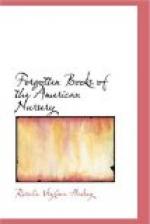Certain titles indicate the nature of the meagre juvenile literary fare in the beginning of the new eighteenth century. In seventeen hundred Nicholas Boone, in his “Shop over against the old Meeting-house” in Boston, reprinted Janeway’s “Token for Children.” To this was added by the Boston printer a “Token for the children of New England, or some examples of children in whom the fear of God was remarkably budding when they dyed; in several parts of New England.” Of course its author, the Reverend Mr. Mather, found colonial “examples” as deeply religious as any that the mother country could produce; but there is for us a grim humor in these various incidents concerning pious and precocious infants “of thin habit and pale countenance,” whose pallor became that of death at so early an age. If it was by the repetition of such tales that the Puritan divine strove to convert Cressy, it may well be that the son considered it better policy, since Death claimed the little saints, to remain a sinner.
By seventeen hundred and six two juvenile books appeared from the press of Timothy Green in Boston. The first, “A LITTLE BOOK for children wherein are set down several directions for little children: and several remarkable stories both ancient and modern of little children, divers whereof are lately deceased,” was a reprint from an English book of the same title, and therefore has not in this chronicle the interest of the second book. The purpose of its publication is given in Mather’s diary:
[1706] 22d. Im. Friday.
About this Time sending my little son to School, Where ye Child was Learning to Read, I did use every morning for diverse months, to Write in a plain Hand for the Child, and send thither by him, a Lesson in Verse, to be not only read, but also Gott by Heart. My proposal was to have the Child improve in goodness, at the same time that he improved in Reading. Upon further Thoughts I apprehended that a Collection of some of them would be serviceable to ye Good Education of other children. So I lett ye printer take them & print them, in some hope of some Help to thereby contributed unto that great Intention of a Good Education. The book is entituled Good Lessons for Children; or Instruction provided for a little Son to learn at School, when learning to Read.
Although this small book lives only by record, it




